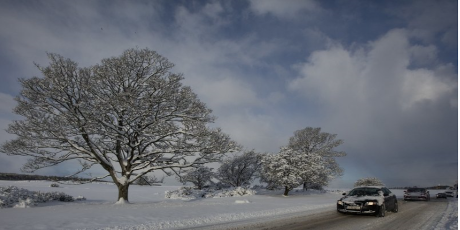How severe weather events like cold snaps affect energy prices 15 Feb 2021

Analysis: the current blast of cold weather has a strong influence on how much we pay for gas and electricity - Dr. Paul Deane, Senior Research fellow, Energy Policy and Modelling Group, MarEI Centre/ERI
As countries around the world move away from fossil fuels to limit global warming, cold snaps, like this week's 'Beast from the East' will continue to have a profound impact on our future energy landscape. The prices we pay for energy are strongly impacted by international geopolitics, but weather has, and will continue to exact a strong influence.
Even events that happen far away from us ripple across the world to our shores and change how much it costs to generate electricity and heat our homes. In January 2021, Beijing recorded the coldest temperature since 1966. This severe cold spell coincided with power outages in Japan and Korea and congestion on the Panama Canal which slowed international shipments of natural gas to the region. The result was a significant increase in natural gas prices around the world, which we will see in Ireland through the increased cost of generating electricity here.
This is not a new phenomenon. Extreme and prolonged spells of bad weather has led to big energy changes at home and abroad. In 1947, the UK was hit by a long period of very cold weather and a series of severe blizzards between the end of January and early March. The UK Meteorological Office reported that "snow fell every day somewhere in the UK for a run of 55 days," and "February 1947 was the coldest February on record in many places."
Because of the cold, demand for coal, gas and electricity surged as the country struggled to keep warm and maintain industrial activity. Snow impacted the movement of coal which was used to generate electricity and the country was effected by power cuts, some of which lasted up to 12 hours. To reduce demand for energy, factories were closed, radio and television broadcasts were limited and unemployment soared for the winter period. The UK was poorly prepared for the prolonged event and the aftermath was one element that drove the diversification of fuel choices towards nuclear energy and oil.
Closer to home, Ireland’s power system in the 1950s and 1960s was impacted by significant prolonged weather events which exposed the challenges with the then main sources of electricity; hydro power and peat. In 1958 and again in 1963, Ireland experienced particularly wet weather conditions in one year and very dry conditions in the following one. This affected peat harvesting and water levels in the hydro power stations respectively, reducing the ability for peat-fired and hydro-based electricity generation.
During this period, the ESB archives tell us that the demand for electricity was growing "vigorously" at 8% in some years, which exasperated the situation. While these events stressed the power system immensely, it was not until the oil crises in the 1970s that government policy looked to diversity and plan for energy shortages.
Weather has and will continue to shape and impact our electricity system. As we move to a future with more weather driven renewables such as wind and solar, we must prepare for this. A recent study done in UCC in collaboration with the Electricity Association of Ireland looked at the future power system to understand the impact of weather and how it influences the reliability of electricity supply.
We borrowed a concept from German researchers which looks at weather periods called dunkelflaute which loosely describes times of the year when neither sun nor wind are to be found in great abundance. These periods can also coincide with very cold weather like the ‘Beast from the East’ which increases the demand for electricity as we stay indoors and use more appliances.
We found that wind and solar generation are the best way to reduce our emissions, but conventional fossil fuel plant will continue to play an important role over the next decade during these cold calm periods providing backup power and spare capacity. This is surprising as it tells us that we must accelerate the deployment of clean renewables across Ireland, but also build some more conventional plant, which will operate less though still play an important role even alongside technologies such as batteries and interconnectors to other countries.
As we leave fossil fuels behind for a cleaner future, we must not ignore the lessons of the past, and remember that weather matters. In Ireland, our demand for electricity is rising as we build more data centres and plug in new devices, while at the same time conventional power stations are closing.. A reliable and secure electricity supply comes from spare capacity and infrastructure that will often sit idle for long periods without ever being used. It is like an insurance policy that we must pay for, and when we use it can help us as the costs of any electricity disruption can be enormous.